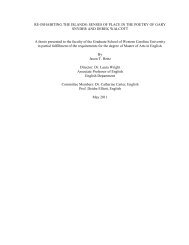SUMMERS, KAREN CRADY, Ph.D. Reading Incest - The University ...
SUMMERS, KAREN CRADY, Ph.D. Reading Incest - The University ...
SUMMERS, KAREN CRADY, Ph.D. Reading Incest - The University ...
Create successful ePaper yourself
Turn your PDF publications into a flip-book with our unique Google optimized e-Paper software.
14<br />
CHAPTER II<br />
‘SWICHE UNKYNDE ABHOMINACIOUNS’: MEDIEVAL INCEST<br />
When called upon to tell his tale in the Canterbury Tales, the Man of Law protests<br />
that he is unable to find one that Chaucer has not already told, for “if he have noght seyd<br />
hem, leve brother, / In o book, he hath seyd hem in another” (MLT 51-2). Although he<br />
has written of Lucrece, Thisbee, <strong>Ph</strong>yllis, Helen, Penelope, Dido, Ariadne, and many other<br />
women who suffered for love, the Man of Law praises Chaucer for not writing tales of<br />
incest:<br />
But certainly no word ne writeth he<br />
Of thilke wikke ensample of Canacee,<br />
That loved hir owene brother sinfully—<br />
Of swich cursed stories I sey fy! --<br />
Or ellis of Tyro Appollonius,<br />
How that the cursed kyng Antiochus<br />
Birafte his doghter of hir maydenhede,<br />
That is so horrible a tale for to rede<br />
Whan he hir threw upon the pavement,<br />
And therefore he, of ful avysement,<br />
Wolde nevere write in none of his sermons<br />
Of swiche unkynde abhomynacions (MLT 77-88)<br />
<strong>The</strong>se tales of “unkynde abhomynacions” are included in the Confessio Amantis of<br />
Chaucer’s contemporary, John Gower. Chaucer had previously commended Troilus and<br />
Criseyde to “moral Gower” (T&C 1856). Moreover, the Man of Law goes on to tell the
















